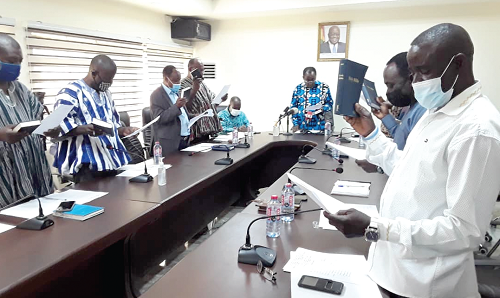
Don’t allow Tono Irrigation Scheme to collapse - ICOUR Board charged
The Minister of Food and Agriculture, Dr Owusu Afriyie Akoto, has charged the newly appointed eight-member Board of the Irrigation Company of Upper Region (ICOUR) to make sure that the Tono Irrigation Scheme (TIS), which is currently undergoing rehabilitation, does not collapse because of the lack of vision and poor management.
He explained that the government was spending about $36 million from a World Bank facility to revive the scheme, hence the board should ensure that the investments made yielded the desired results in order for it to become self-financing.
That, he noted, would also guarantee that in the next four decades or more, the scheme would not “decay, thereby wasting the taxpayers money,” but develop to boost the tourism and fisheries sectors also.
Dr Akoto made these remarks in Accra recently when he swore in the ICOUR board members.
ICOUR, Tono project
The ICOUR was established by the government to promote the production of food crops by small-scale farmers within organised and managed irrigation schemes, with the objectives of improving food security and increasing incomes.
ICOUR is an autonomous company wholly owned by the government with the Irrigation Development Authority (IDA), as its representative. It operates the Tono and Vea Irrigation schemes in the Upper East Region.
The Ghana Commercial Agricultural Project (GCAP), a World Bank/Government of Ghana funded project under the Ministry of Food and Agriculture, is currently rehabilitating the three large public irrigation schemes, namely the Tono Irrigation Scheme (TIS) in the Upper East Region, the Kpong Left Bank Irrigation Project (KLBIP) in the Volta Region and the Kpong Irrigation Scheme (KIS) in the Eastern and Greater Accra regions.
The rehabilitation and modernisation of the TIS started on October 16, 2018. However, about 12 months into the 18-month construction period, the spillway channel of the dam got damaged after continuous heavy rain and spillage events in October 2019.
Charge
Dr Akoto said he was saddened by the fact that such a huge investment was allowed to “whittle away with facilities like silos, bungalows, farm machinery and chalets, depriving the nation of the opportunity to become a main exporter of farm produce such as rice and tomatoes within the West Africa sub region and the world at large.
He charged the new board; “You must have vision and drive and make sure that this project becomes a model for similar projects in the country."
He also tasked the board to put in place effective measures to help maintain the scheme, while the government brought on board investors and the private sector to manage various aspects.
“The structure of the current management is going to change so that the scheme becomes self-financing in the next 40 years; it should be able to produce more to feed the nation and for exports," the minister said.
He gave an assurance that although the United States Agency for International Development (USAID) at a point pulled out as one of the financiers of the scheme, the government would ensure that work was completed by the first quarter of next year.
“We are looking for more financiers so that we can also revive the Vea dam; these dams were built about 40 years ago but due to lack of maintenance they were rundown,” Dr Akoto stated.
Board members
The Chairman of the Board, Mr Stephen Yakubu, who is also the Upper East Regional Minister, pledged on behalf of the board members to handle their responsibilities and tasks well.
He stated that he had already visited the Tono dam site where he had charged the ICOUR officials to ensure that on no account should tomato traders cross over to Burkina Faso to purchase tomatoes because through the scheme, the Upper East Region could also produce quality tomatoes for public consumption and for export.
The rest of the board members are the Upper East Regional Director of the Department of Agriculture, Mr Francis Ennor; acting Managing Director of ICOUR, Dr Benedict Bonaventure Aligebam; Chief Executive Officer of the Ghana Irrigation Development Authority (GIDA), Mr Wilson Darkwa, and a representative of the Ministry of Finance, Mr David Mawuko Awumee Quist.
The others are a Representative of Vea farmers, Mr Michael Adooh; a representative of Tono farmers, Mr Robert Abokah and the Upper East Regional Manager of GIDA, Mr Andrew Alalbila.
Farmers expectations
Mr Abokah, who spoke to the Daily Graphic after the swearing in, stated that with the new board in place farmers were expecting a number of their issues to be resolved.
He listed them as the need for the government to subsidise land preparation equipment such as power tillers for farmers to buy to avoid late planting of farm produce.
Farmers, he noted, also needed combine harvesters because the only one available was being shared by farmers in the Tono and Fumbisi rice valley areas.
“Inadequate rice mills are also a challenge because so far only one rice mill procured by a private individual is available at the Tono site,” he said.
Mr Abokah expressed concern about cheating by some traders from Kumasi who bought paddy rice at the Tono site at low prices, thereby making farmers lose income.
“For now I can tell you that the strength of ICOUR depends on the farmers. If the farmers are not there, ICOUR will not be there so they have been put there to help farmers," he noted.